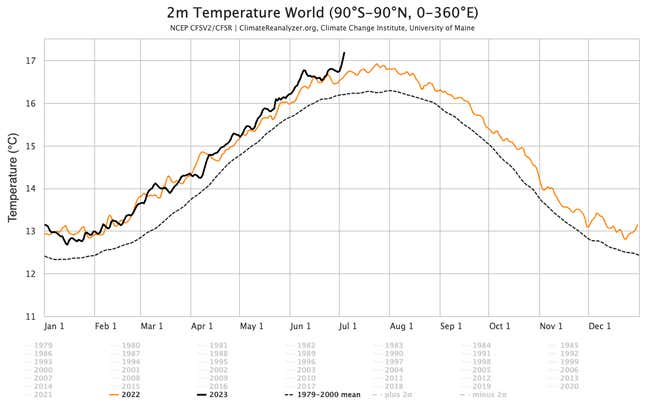Researchers in the US reported that the Earth experienced the hottest day ever recorded by humans on July 3. Unofficial data from University of Maine scientists at the Climate Reanalyzer project first suggested the record had been broken, an observation later confirmed by scientists at the US National Centers for Environmental Prediction (NCEP).
Quartz Smart Investing: Elyse Ausenbagh Part 2
And there’s more to come. New data from Climate Reanalyzer suggests, in fact, that the July 3 record was broken the very next day, although this awaits official confirmation.
Climate Reanalyzer’s preliminary record for the hottest day is based on data that only dates back to 1979, when satellite monitoring records began. But the US agency was able to go back further to 1880, which includes widespread instrumental records from the National Oceanic and Atmospheric Administration (NOAA).
The average global air temperature at 2 meters (about 6 feet) above the ground topped 17 degrees Celsius (62.6 degrees Fahrenheit) for the first time, surpassing the previous record of 16.92°C (62.46°F), reached in July and August of 2016.
“NCEP has placed Earth’s average temperature yesterday as the hottest single day thus far measured by humans,” Robert Rohde, lead scientist at University of California, Berkeley’s environmental data science team Berkeley Earth, tweeted on July 4. Greenhouse gas emissions generated by human activity and responsible for global warming are being compounded by the El Niño effect—the name that climatologists give to the periodically warming of the surface temperatures in the tropical Pacific Ocean, which can drive weather patterns worldwide.
“Now that the warmer phase of El Niño is starting we can expect a lot more daily, monthly and annual records breaking in the next 1.5 years,” climate researcher Leon Simons told the BBC.
Charted: Global heat is breaking records

June was the hottest month on record
The new heat record comes on the heels of one of the warmest month ever recorded in parts of the world, including in the UK, where the meteorological agency warned that new heat records would occur more frequently because of the impact of the use of fossil fuels, a major source of greenhouse gases, on the planet. “Alongside natural variability, the background warming of the Earth’s atmosphere due to human induced climate change has driven up the possibility of reaching record high temperatures,” said Paul Davies, Met Office climate extremes principal fellow and chief meteorologist.
Over the July 4th weekend in the US, heat advisories were put in place for more than 30 million people as multiple states saw temperature surpass 100°F (37.7°C) for days on end.
In Asia, the Chinese capital of Beijing reported almost 10 straight days of temperatures above 35°C. Heat waves sweeping India are exacerbating poverty, increasing incidences of gender-based violence, and causing dozens of deaths.
Quotable: An unwanted milestone
“This is not a milestone we should be celebrating…It’s a death sentence for people and ecosystems.”—Climate scientist Friederike Otto of the Grantham Institute for Climate Change and the Environment at Imperial College, London.
Global warming, by the digits
40 billion: Tonnes of planet-warming CO2 humans are emitting into the atmosphere every year, according to senior climate scientist Pieter Tans from the NOAA’s Global Monitoring Laboratory
98%: The likelihood of an El Niño event making at least one of next five years, and the five-year period as a whole, the warmest on record—beating the record set in 2016 when there was an exceptionally strong El Niño
12-17°C: How much the world’s average air temperature fluctuates on any given day over the year
17.18°C: The average global air temperature at 2 meters above ground on July 4, according to unofficial data, which would mean the July 3 record has already been broken. Official confirmation from the NOAA is pending
2,000: People who reported heat stress over two days at the end of June during the hajj religious pilgrimage in Saudi Arabia, when temperatures reached 48°C
One more thing: The world is getting hotter
Clocking record temperature across a day or two isn’t ominous in itself. “In the climate assessment community, I don’t think we’d assign the kind of gravitas to a single day observation as we would a month or a year,” according to Deke Arndt, director of the National Center for Environmental Information, a division of NOAA.
But it is a worrying sign that global warming is entering unchartered territory. “Unfortunately, it promises to only be the first in a series of new records set this year,” Zeke Hausfather, a research scientist at Berkeley Earth, warned. Things like heatwaves, wildfires, air pollution, flooding, and storms will get worse, and consequently lead to crop losses, diseases, and migration.
The climate target set in the 2015 Paris Agreement, of keeping global temperatures from rising more than 2°C and preferably no more than 1.5°C above pre-industrial levels, is increasingly under threat as those increases have already been recorded over several days. In Europe, temperatures in 2022 were about 2.3°C higher than pre-industrial levels. If global temperatures were to pass the Paris Agreement target, life on Earth would never be the same. Some of the consequences include mass species extinction, increasingly common and deadly extreme weather events, and melting glaciers would trigger mass flooding, threatening some of the world’s most populous cities.
Related stories
🌡️ Rising temperatures are pushing India towards the deadly “wet bulb” threshold
😆 Using humor to talk about climate change makes it easier to take action
🌳 Can millions of genetically modified trees slow climate change?
>>> Read full article>>>
Copyright for syndicated content belongs to the linked Source : Quartz – https://qz.com/july-3-hottest-day-ever-recorded-planet-earth-1850605203










